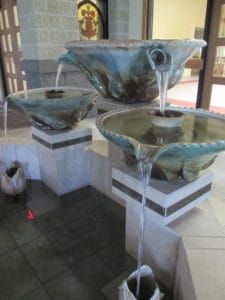On this Fourteenth Sunday in Ordinary Time we share a Franciscan Gospel reflection and questions written by Fr. Paul Gallagher, OFM. They are edited by Franciscan Sister of Christian Charity Sister Anne Marie Lom and Joe Thiel. The excerpts from the Sunday readings are prepared by Joe Thiel. To read or download the complete pdf with excerpts for your prayer, please click here: Franciscan Gospel Reflection July 8 2018. Excerpts from the Lectionary for Mass for Use in the Dioceses of the United States of America, second typical edition © 2001, 1998, 1997, 1986, 1970 Confraternity of Christian Doctrine, Inc., Washington, DC. Used with permission. All rights reserved. No portion of this text may be reproduced by any means without permission in writing from the copyright owner. Please include this information when printing.
Photos: Saints Anthony and Philip, Highland, Wisconsin, Pastor Father James Murphy (brother of our Sister Kathleen Murphy)
Mark 6:1-6
Jesus departed from there and came to his native place, accompanied by his disciples.
When the Sabbath came he began to teach in the synagogue, and many who heard him were astonished. They said, “Where did this man get all this? What kind of wisdom has been given him? What mighty deeds are wrought by his hands! Is he not the carpenter, the son of Mary, and the brother of James and Moses and Judas and Simon? And are not his sisters here with us?”
And they took offense at him. Jesus said to them,
“A prophet is not without honor except in his native place and among his own kin and in his own house.” So he was not able to perform any mighty deed there, apart from curing a few sick people by laying his hands on them. He was amazed at their lack of faith.
Background
The text for this Sunday’s gospel follows directly from last week’s text. The response of the people to Jesus’ presence is dramatically different. The faith of both Jairus and the woman who had been hemorrhaging for twelve years in last week’s gospel was inspiring. The response of the people of Nazareth in this week’s text is debilitating. They do not take offense in Jesus’ teaching. Mark states clearly in verse 2 “… many who heard him were astonished.” Rather, they reject Jesus because he is acting out of character—out of character for the son of a carpenter that they know him to be. Their struggle is based on the most basic of values for people of the day, honor.
Each person held a certain status in the community and they were entrusted with the responsibility to maintain that status. To try to rise above that status was a disruption of the social structures of the day. This was dishonorable. A major factor in determining a person’s status in the community was their family. Sons were expected to carry on the trade and business of their father. Jesus was expected to be a carpenter like his father.
Mark signals the community’s displeasure with Jesus by referring to him in verse 3 as the son of Mary. Nazareth is the town of Joseph. Usually people were designated as the son of their father. James and John are known as the sons of Zebedee. When a person was referred to as the son of their mother, it usually was because the father was uncertain. Mark’s community would have understood this as a clearly derogatory statement. It is also how Jesus understands the situation, and how he responds to his friends and family who are refusing to grant him the honor that his teaching deserves. He responds by first quoting them a familiar proverb, and then, disturbed by their lack of trust in him, he moves on without performing any mighty works.
Perhaps most of us realize that there is a great deal of Jesus’ public life for which we have no record. Mark, like all the gospel writers, had to select what events in the life of Jesus would be included in his gospel. Why would Mark include a text that is not flattering to the people of Jesus’ hometown? Why would he suggest, in some way, that Jesus was negatively affected by the townspeople’s reaction to him? This text could be problematic for Christian missionaries who are trying to convince people that Jesus was the Messiah. Would the Messiah be flustered by a negative reaction to his message? Perhaps Mark chose to include this text because Jesus’ experience here is very similar to the people of Mark’s community. They, too, were Jews who tried to share their faith in Jesus as the Messiah with their families and neighbors. Most of them received criticism and rejection in response.
Reflection Questions
1. Who are the people that you hold in esteem? How are these people different from others? Are there one or two qualities that are common among them all?
2. When I think of Jesus being criticized because he did not meet the expectations of his family and neighbors, I ….
3. The proverb that Jesus quotes, “A prophet is not without honor except in his native place and among his own kin and in his own home” reminds me …
4. The fact that Jesus is affected by the negativity of his family and neighbors …
5. The people of Nazareth would have heard reports of what Jesus had done, they knew people who witnessed those things, and perhaps they had been present themselves for some of them. Yet they do not seem to be able to have faith in him. They knew what kept them from having faith in him. Do you know what keeps you from having the kind faith you desire?
6. Can you take to some time to talk with God about your experience of rejection, not being able to fulfill the expectations of other, or yourself or what ever struck you most stringing in this gospel?




